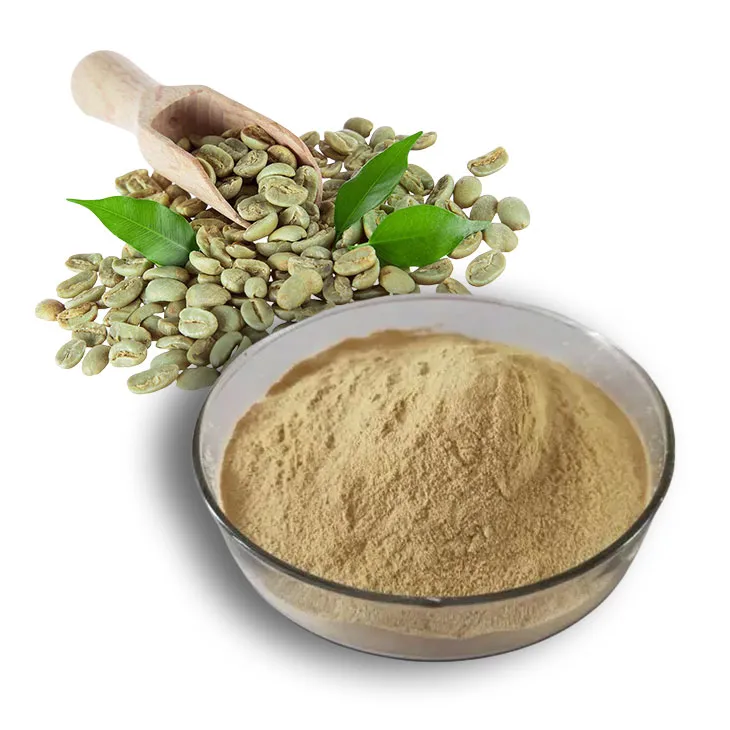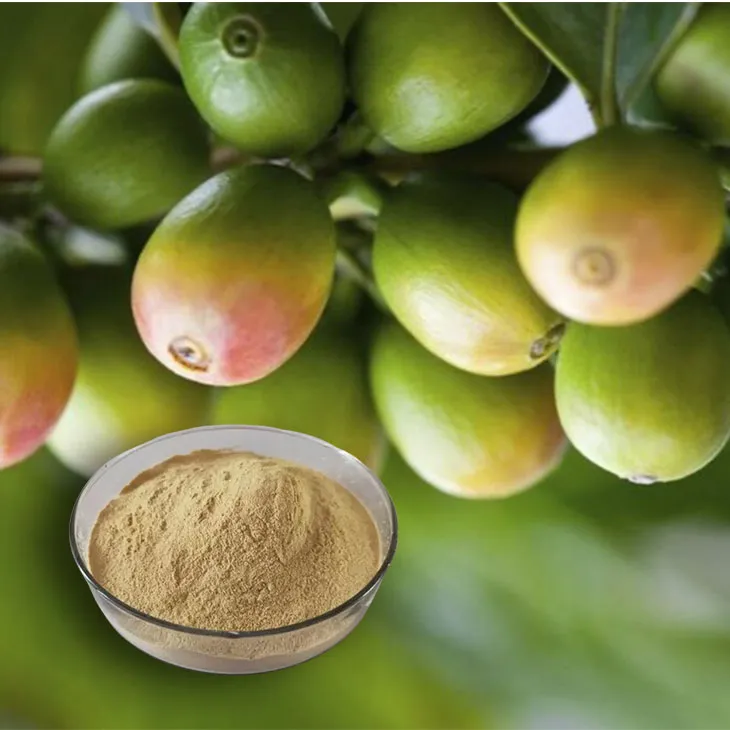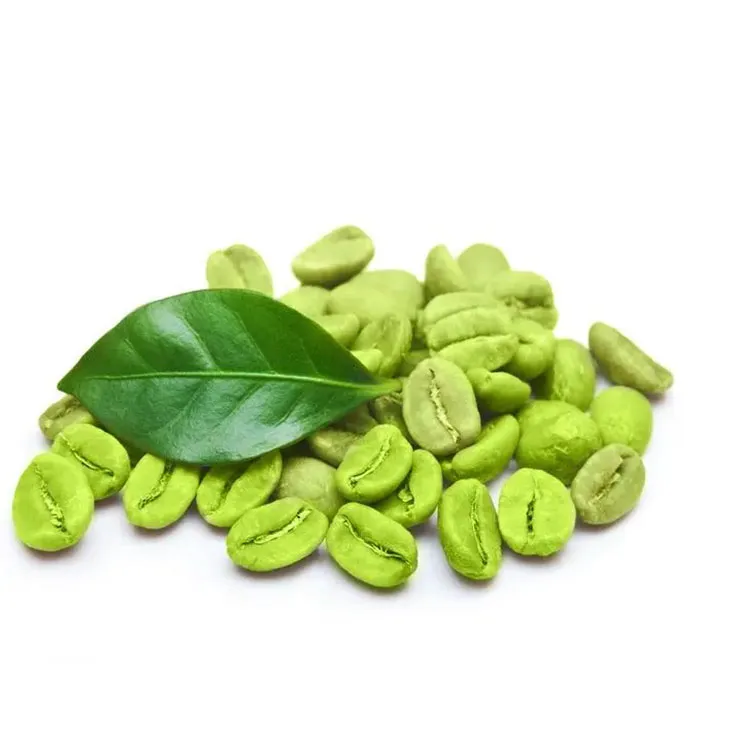- 0086-571-85302990
- sales@greenskybio.com
Benefits of Green Coffee Bean Extract in Cattle Feed.
2024-11-14

Introduction
In the world of livestock farming, the search for natural and effective additives in cattle feed is an ongoing process. One such promising additive is the Green coffee bean Extract. This extract, which is rich in various bioactive compounds, has the potential to bring about multiple benefits in cattle rearing. The use of Green coffee bean Extract in cattle feed is not only beneficial for the health and productivity of the cattle but also has positive implications for environmental sustainability.

Immune System Modulation
The Green coffee bean Extract contains substances such as chlorogenic acid, which can play a significant role in modulating the immune system of cattle. A well - functioning immune system is crucial for the overall health of cows.
Enhanced Disease Resistance
When cows have a stronger immune system, they are more resistant to various diseases. This is of great importance as it can reduce the need for antibiotics and other medications. Antibiotic overuse in livestock farming has been a concern in recent years, as it can lead to the development of antibiotic - resistant bacteria. By enhancing the natural immunity of cows, green coffee bean extract can contribute to the reduction of antibiotic use, which in turn is beneficial for the safety of livestock products.

Metabolic Effects
The addition of green coffee bean extract to cattle feed can also have a profound impact on the metabolism of cattle.
Efficient Energy Utilization
By influencing metabolic pathways, the extract may help cows in more efficient energy utilization. This is especially important for different physiological processes in cows such as growth, reproduction, and lactation.
- For growth, efficient energy utilization means that calves can develop more rapidly and reach their optimal body weight at a faster rate. This can lead to shorter rearing periods and potentially higher economic returns for farmers.
- In terms of reproduction, proper energy management is essential. Cows with well - regulated energy metabolism are more likely to have regular estrous cycles, successful conceptions, and healthy pregnancies.
- During lactation, cows need a large amount of energy to produce milk. The green coffee bean extract can help them better utilize the energy from the feed, which may result in increased milk production and improved milk quality.

Environmental Benefits
The use of green coffee bean extract in cattle feed also has positive environmental implications.
Reduced Waste Excretion
When cattle can better absorb and utilize nutrients from the feed due to the addition of this extract, there is less waste excreted. This has several advantages:
- It reduces the environmental pollution caused by livestock farming. Livestock waste can contain high levels of nutrients such as nitrogen and phosphorus. Excessive amounts of these nutrients in the environment can lead to water pollution, soil degradation, and other environmental problems. By reducing waste excretion, the impact of livestock farming on the environment can be mitigated.
- It makes the livestock - farming process more sustainable. Sustainable livestock farming is becoming increasingly important as the world focuses on environmental conservation. By reducing waste and improving nutrient utilization, farmers can contribute to a more sustainable agricultural system.
Other Potential Benefits
There may be other potential benefits of using green coffee bean extract in cattle feed that are yet to be fully explored.
Antioxidant Properties
The chlorogenic acid and other compounds in the green coffee bean extract have antioxidant properties. In cattle, these antioxidants may help in protecting cells from oxidative damage. Oxidative stress can occur due to various factors such as exposure to environmental toxins, poor diet, or disease. By reducing oxidative stress, the extract may contribute to the overall health and well - being of cows.
Improved Gut Health
There is also a possibility that the green coffee bean extract can have a positive impact on the gut health of cattle. A healthy gut microbiome is essential for proper digestion and nutrient absorption. The extract may influence the composition of the gut microbiota, promoting the growth of beneficial bacteria and suppressing the growth of harmful ones.
Conclusion
In conclusion, the addition of green coffee bean extract to cattle feed offers a wide range of benefits. It can modulate the immune system of cattle, leading to enhanced disease resistance and reduced antibiotic use. It also has positive effects on the metabolism of cattle, which is crucial for growth, reproduction, and lactation. Moreover, from an environmental perspective, it can reduce waste excretion, making livestock farming more sustainable. While there are still areas that need further research, such as the long - term effects and the optimal dosage of the extract, the potential of green coffee bean extract in cattle feed is very promising.
FAQ:
1. How does green coffee bean extract modulate the immune system of cattle?
Green coffee bean extract is rich in chlorogenic acid and other substances. These components can interact with the immune cells and signaling pathways in cattle's bodies. They may enhance the function of immune cells such as macrophages and lymphocytes, which are important for recognizing and eliminating pathogens. This overall enhancement helps in modulating the immune system, making cows more resistant to diseases.
2. Why is reducing the need for antibiotics in cattle important?
Reducing the need for antibiotics in cattle is crucial for several reasons. Firstly, excessive use of antibiotics can lead to the development of antibiotic - resistant bacteria. These resistant bacteria can be transferred to humans through the food chain or the environment, causing difficulties in treating human infections. Secondly, for the safety of livestock products, lower antibiotic use means less antibiotic residue in products like milk and meat, which is beneficial for consumers' health.
3. How does green coffee bean extract affect the metabolism of cattle?
The extract can influence metabolic pathways in cattle. It may interact with enzymes involved in energy metabolism, such as those in glycolysis or fatty acid metabolism. By doing so, it can help the cattle to better utilize energy sources from the feed. For example, it might enhance the conversion of nutrients into useful forms of energy, which is vital for growth, reproduction, and lactation processes in cows.
4. In what way does the addition of green coffee bean extract make livestock - farming more sustainable?
When green coffee bean extract is added to cattle feed, cattle can better absorb and utilize nutrients from the feed. As a result, there is less waste excreted. Reduced waste means less environmental pollution caused by livestock farming, such as lower levels of nitrogen and phosphorus in manure. This also helps in conserving resources as the feed is used more efficiently, making the livestock - farming process more sustainable.
5. Are there any potential drawbacks to adding green coffee bean extract to cattle feed?
Currently, while there are many benefits associated with adding green coffee bean extract to cattle feed, potential drawbacks need to be further investigated. One possible concern could be the cost of adding the extract to the feed on a large - scale farming operation. Also, it is important to ensure that the extract does not cause any unforeseen negative effects on cattle health in the long - term, such as potential interactions with other feed components or changes in gut microbiota that could be harmful.
Related literature
- Title: The Role of Chlorogenic Acid in Animal Nutrition"
- Title: "Beneficial Substances in Green Coffee Bean Extract for Livestock"
- Title: "Green Coffee Bean Extract: A New Perspective in Cattle Feed"
- ▶ Hesperidin
- ▶ citrus bioflavonoids
- ▶ plant extract
- ▶ lycopene
- ▶ Diosmin
- ▶ Grape seed extract
- ▶ Sea buckthorn Juice Powder
- ▶ Beetroot powder
- ▶ Hops Extract
- ▶ Artichoke Extract
- ▶ Reishi mushroom extract
- ▶ Astaxanthin
- ▶ Green Tea Extract
- ▶ Curcumin Extract
- ▶ Horse Chestnut Extract
- ▶ Other Problems
- ▶ Boswellia Serrata Extract
- ▶ Resveratrol Extract
- ▶ Marigold Extract
- ▶ Grape Leaf Extract
- ▶ blog3
-
Cranberry Plants and Skin - care Products.
2024-11-14
-
Beetroot Powder
2024-11-14
-
Yam Extract
2024-11-14
-
Dandelion Leaf Extract
2024-11-14
-
Lily extract
2024-11-14
-
Konjac Powder
2024-11-14
-
Avocado Extract Powder
2024-11-14
-
Alisma Extract
2024-11-14
-
Grape Leaf Extract
2024-11-14
-
Curcumin
2024-11-14
-
Natural grape seed extract
2024-11-14





















